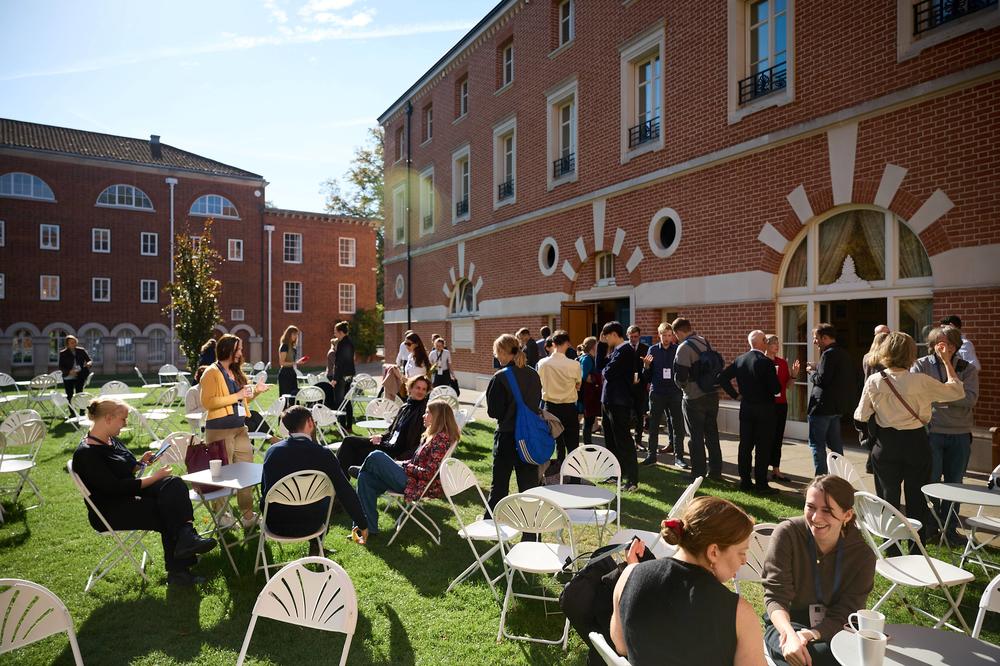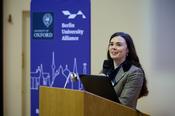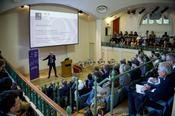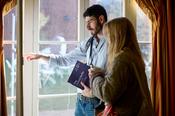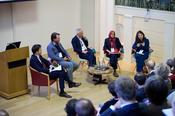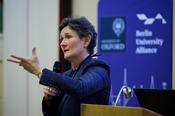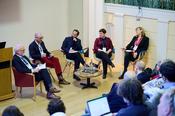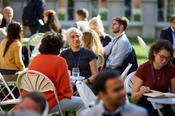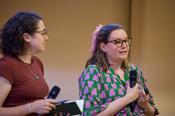"Innovation: Pathways to Societal Impact"
The fourth symposium of the Oxford Berlin Research Partnership addressed the topic of innovation from a variety of perspectives.
Oct 07, 2025
On September 30, 2025, the Academic Directors of the Oxford Berlin Research Partnership opened the fourth joint symposium in the Simpkins Lee Theatre at Lady Margaret Hall in Oxford. Alexander Betts, Pro-Vice-Chancellor for External Engagement at the University of Oxford, and Beate Kampmann, Einstein Professor of Global Health at Charité, welcomed the 130 guests from Berlin and Oxford to the packed auditorium. They looked back on how the partnership started as a new and different form of cooperation after Brexit, and how fruitful it has become since then, with over 17 million Euros in third-party funding raised as a result of joint seed-funding.
Partnership coordinator Aoife Ní Chroidheáin Lau moderated the full-day programme of panel discussions and presentations and introduced the first round of discussions. The first panel was entitled “Innovation, Science and the Environment” and was opened and moderated by Henry Marx, Berlin State Secretary for Higher Education and Research. The panellists Matthew Wood, Sarah Khalid, Martin Rahmel, and Doris Meder discussed how to foster entrepreneurial spirit among academics, and how science-driven innovations can be promoted and used to address some of our greatest global challenges, such as global health and the climate crisis.
Irene Tracey, Vice-Chancellor of the University of Oxford, then gave a keynote address in which she presented Oxford's ecosystem for promoting innovation, which consists of three pillars: The entrepreneurship hub “EnSpire Oxford”, “Oxford University Innovation” for spin-outs, and the independent “Oxford Science Enterprises” (OSE) for financing. She described the impact the £500 million raised by OSE as a turning point for the Oxford innovation landscape – since then, Oxford sees more than 25 spin-outs per year.
The second panel was entitled “Innovation, AI and the Arts” and offered a remarkable range of perspectives. Moderated by David de Roure, Florian Conradi, Kathryn Eccles, Frank Fischer, and Christine Gerrard discussed digital culture and creative technologies, community-oriented innovation, and the changing role of the arts in the age of AI.
The afternoon sessions began with a presentation by Megan Gooch and Ayla Karamann on the activities of GLAM (The University of Oxford’s Gardens, Libraries and Museums) and its connections to Berlin, including, for example, a joint hackathon between the Bodleian Libraries and the Berlin State Library, as well as a cross-institutional collaboration with the Prussian Cultural Heritage Foundation (SPK).
Led by Petra Schleiter, the panellists on the day's third panel, entitled “Innovating for Democracy: Building Resilience in a Changing World,” Lauren Sukin, Florian Jeßberger, Tim Wappenhans, and Katerina Tertytchnaya, analyzed the rapidly changing challenges to democracy and effective responses to them from a social, institutional, and global perspective.
The closing panel was entitled “Innovation Ecosystems” and focused on the advantages and obstacles of the respective innovation ecosystems in Berlin and Oxford. Moderated by Olga Kozlova, Mairi Gibbs, Søren Salomo, and Markus Ralser discussed efficient technology transfer and attracting investment in Oxford, as well as Berlin's open innovation networks and their interdisciplinary focus.
Michael Bojdys then gave a short presentation on BioBlock, a secure knowledge-sharing platform that enables decentralized collaboration in the biotechnology industry to promote transfer and innovation.
Finally, Academic Director Alexander Betts looked back on the exciting insights and discussions of the conference day and invited the symposium guests to a networking reception.
The fifth joint symposium of the Oxford Berlin Research Partnership will take place in Berlin next year and will once again provide a platform for exchange within the ever-growing Oxford Berlin Research Community.

